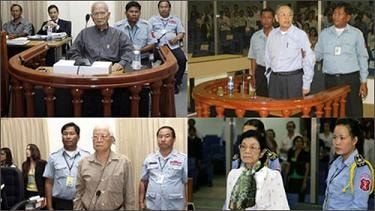Four former Khmer Rouge leaders all deny responsibility.
The defendants' uncooperative attitude in repeatedly leaving the courtroom during the trial angered those attending the trial.
On June 30, the Khmer Rouge Tribunal in Cambodia completed the fourth and final day of the first trial of the four surviving former leaders of the Khmer Rouge regime. The trial received special attention from the Cambodian people and the international press, with the hope that justice will be served to those responsible for the deaths of nearly 2 million Cambodians under the brutal Khmer Rouge regime from 1975 to 1979.

The defendants, from left to right, include: Nuon Chea, Ieng Sary,
Khieu Samphan and Ieng Thirith
The four defendants brought to trial in the first trial of "File No. 002" include: Nuon Chea, the second in command after Pol Pot, Ieng Sary, the Minister of Foreign Affairs, Ieng Thirith (Ieng Sary's wife), the Minister of Social Affairs, and Khieu Samphan, the President... under the Khmer Rouge regime. These four people were accused of genocide, war crimes, crimes against humanity, and many other crimes related to the deaths of a quarter of the Cambodian population during the 3 years, 8 months, and 20 days of the Khmer Rouge regime.
After four days of trial, the Court approved the final list of 1,092 witnesses from the parties, preparing for the actual trial that could begin in late August or early September. The Court also listened to the lawyers and representatives of the parties present the first grounds of indictment or defense. Notably, up to this point, in all their statements at the trial, the four defendants have denied their responsibility for the charges and declared their innocence. In addition, the defendants' uncooperative attitude when they repeatedly left the courtroom during the trial has caused frustration among those attending and following the trial.
Mr. Hun Chim, 76 years old, a victim under the Khmer Rouge regime, affirmed: "I do not believe they are innocent. The defendants are guilty. They are senior leaders of the regime. They set the guidelines so their subordinates dare to act. They must know and take responsibility for what happened. Every country must have leaders, I oppose their not taking responsibility for the crimes of genocide."
The recent trial is only one of the first steps in the long journey to justice for the 2 million victims of the Khmer Rouge regime and their loved ones. Because of the complex nature of the trial, which has been dubbed a “second Nuremberg,” it is almost certain that the trials will last for months, even years. Among those interested in the trial, there are concerns that, due to their advanced age (the defendants are all between 79 and 86 years old), the defendants may pass away before the verdict is announced. However, for the victims who were lucky enough to survive the dark days of the Khmer Rouge regime, the trial must be carried out to the end, for the sake of justice.
Mr. Bum-Meng, 70 years old, from Com Puong Cham province - one of the 7 survivors of the notorious Tuol Sleng prison said: "At this moment, I still mourn and remember the victims who were murdered, especially my family. My wife and children have died since that day. I miss them very much. Not only my family, Cambodian families but all the people of the world also want to see justice".
Since the Khmer Rouge Tribunal in Cambodia began preparations for the trial of Case 002, 100,000 Cambodians and internationals have visited the Tribunal's headquarters to learn information, attend hearings, and visit exhibitions about the trial process and crimes of the Khmer Rouge.
According to a poll conducted by the Center for Human Rights at the University of California-Berkely (USA) recently announced about the first trial, about 76% of Cambodians surveyed believe that the Khmer Rouge Tribunal will bring justice to the victims and their families. 81% of respondents also believe that bringing the highest-ranking surviving figures of the Khmer Rouge regime to trial will help promote national reconciliation in Cambodia, closing the darkest chapter in the history of the country of pagodas.
According to VOV






